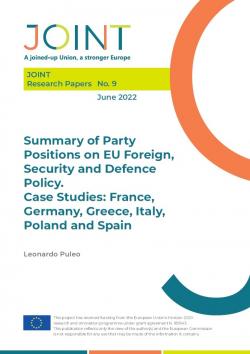Summary of Party Positions on EU Foreign, Security and Defence Policy. Case Studies: France, Germany, Greece, Italy, Poland and Spain
This study explores political parties’ salience and position on foreign policy issues in France, Germany, Greece, Italy, Poland and Spain across time. By analysing the main parties’ electoral manifestos from 2000 to 2020, the study points out how foreign policy and related area, such as internationalism and military issues, have been only marginally addressed in parties’ discourse. EU foreign and security policy remains a low salient issue for all parties in the countries under examination. Still, our analyses highlight a situation of low political salience but high “permissive consensus” on EU foreign and security policy among the public and bipartisan support among the elites. On this point, the extent to which these conditions can be exploited to move further down the path to increased European integration in this policy area seems to depend on whether and how this issue might become politicised.
-
Details
Rome, IAI, June 2022, 53 p. -
In:
-
Issue
JOINT Research Paper 9
Executive summary
1. Data and methods
1.1 The MARPOR data and its foreign policy categories
1.2 Research strategy
2. Comparative trends on the foreign policy issue
3. France
3.1 Individual party stances on foreign policy issues
3.2 Qualitative analysis of the French political parties’ manifestos on foreign policy issues (2012–2017)
3.3 An overview of polarisation and dispersion on foreign policy issues in the French party system
4. Germany
4.1 Individual party stances on foreign policy issues
4.2 An overview of polarisation and dispersion on foreign policy issues in the German party system
5. Greece
5.1 Individual party stances on foreign policy issues
5.2 An overview of polarisation and dispersion on foreign policy issues in the Greek party system
6. Italy
6.1 Individual party stances on foreign policy issues
6.2 Qualitative analysis of the Italian political parties’ manifestos on foreign policy issues (2008–2018)
6.3 An overview of polarisation and dispersion on foreign policy issues in the Italian party system
7. Poland
7.1 Individual party stances on foreign policy issues
7.2 An overview of polarisation and dispersion on foreign policy issues in the Polish party system
8. Spain
8.1 Individual party stances on foreign policy issues
8.2 Qualitative analysis of the Spanish political parties’ manifestos on foreign policy issues (2008–2019)
8.3 An overview of polarisation and dispersion on foreign policy issues in the Spanish party system
Conclusions
References



